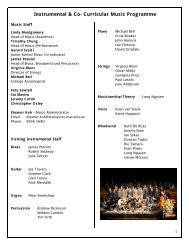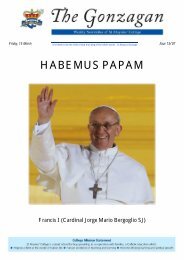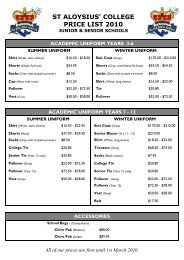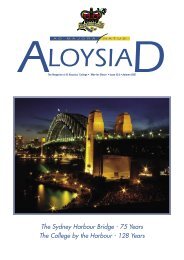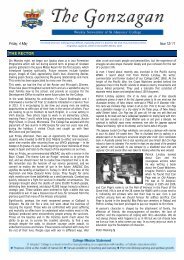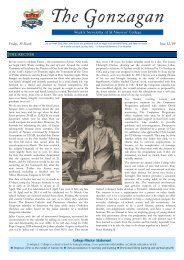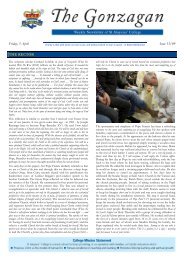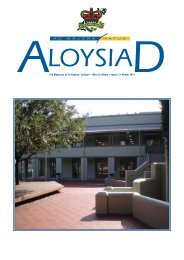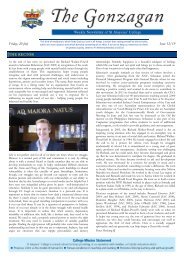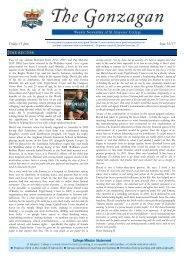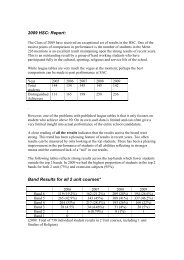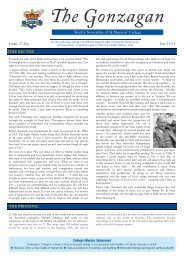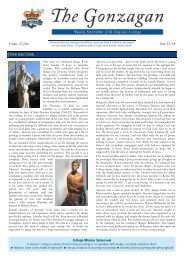The Magazine of St Aloysius' College ⢠'Men for Others' ⢠Issue XLVII ...
The Magazine of St Aloysius' College ⢠'Men for Others' ⢠Issue XLVII ...
The Magazine of St Aloysius' College ⢠'Men for Others' ⢠Issue XLVII ...
Create successful ePaper yourself
Turn your PDF publications into a flip-book with our unique Google optimized e-Paper software.
2020 Summit, Canberra 19 and<br />
20 April<br />
Two Old Boys recently took part in the 2020 Summit<br />
held in Canberra. Michael L’Estrange (SAC 1970) who<br />
is the Secretary <strong>of</strong> the Department <strong>of</strong> Foreign Affairs and<br />
Trade, and Dr John Kramer (SAC 1971), representing<br />
Rural Doctors, spoke at the event. <strong>The</strong> following report was<br />
written by Dr John Kramer.<br />
Well, how do you sum up an event such as this?<br />
It’s never been done be<strong>for</strong>e in Australia and was<br />
producing a variety <strong>of</strong> responses be<strong>for</strong>e it even<br />
started. However, <strong>for</strong> this participant and, I suspect, <strong>for</strong> the<br />
large majority who attended, it was an utterly stimulating<br />
occasion. It left me with a strong sense <strong>of</strong> optimism <strong>for</strong> the<br />
future <strong>of</strong> Australia.<br />
My detailed impressions were <strong>for</strong>med mainly through<br />
involvement in the stream entitled, Towards the Future <strong>of</strong><br />
Rural Industry and Communities. This was one <strong>of</strong> ten streams<br />
which addressed key areas such as Health, the Economy<br />
and Indigenous Australia. I also spoke with a number <strong>of</strong><br />
“summiteers” during the session breaks and attended the<br />
various plenary sessions, which were a mixture <strong>of</strong> panelstyle<br />
interviews or personal viewpoints from selected<br />
speakers, some live and some pre-recorded. All that was<br />
interesting, but the heart <strong>of</strong> the exercise was in the individual<br />
groups where we could get to know each other on a much<br />
more personal level and to work cooperatively on our areas<br />
<strong>of</strong> special interest.<br />
Each session was co-chaired by one expert and the<br />
current relevant minister. In my case it was <strong>for</strong>mer Deputy<br />
Prime Minister and National Party Leader, <strong>The</strong> Hon Tim<br />
Fischer, together with Agriculture Minister, <strong>The</strong> Hon Tony<br />
Burke MP. I sensed that the current ministers had stepped<br />
back from their portfolio and left most <strong>of</strong> the active<br />
management to their co-chairs. I never felt constrained as<br />
to what ideas I might bring <strong>for</strong>ward and how they might<br />
be presented to the group. <strong>The</strong> major limitation was time,<br />
Tim Fischer and John Kramer at 2020 Summit, 19 April 2008.<br />
not goodwill or opportunity. We worked in various sized<br />
groups, ranging from the full group <strong>of</strong> 100 down to sub<br />
–groups <strong>of</strong> around 25 which divided further downwards to<br />
groups <strong>of</strong> 5-7 to consider specific issues.<br />
<strong>The</strong> combined group met on a number <strong>of</strong> occasions.<br />
<strong>The</strong> venue was the Opposition Party Room. This led to the<br />
incongruous sight <strong>of</strong> Tim Fischer and Tony Burke co-chairing<br />
the meetings which took place in a room where photos <strong>of</strong><br />
Liberal Party Leaders from Sir Robert Menzies to Brendan<br />
Nelson adorned the walls!<br />
And so to the issues: these were many and varied, and<br />
there were many that were considered by other groups as<br />
well as mine. Rural Health is a major concern to all rural<br />
residents, so I found ready ears <strong>for</strong> my message <strong>of</strong> enhanced<br />
support <strong>for</strong> rural GPs and families to better recruit and retain<br />
them. I emphasised the need <strong>for</strong> the spouse/partner <strong>of</strong> the<br />
GP to be considered as well. <strong>The</strong>ir employment needs must<br />
be seen as <strong>of</strong> equal importance, along with issues such as<br />
education <strong>for</strong> children and suitable housing.<br />
<strong>The</strong> major national health problem was clearly indigenous<br />
health. This is best illustrated by the seventeen-year gap in<br />
life expectancy between indigenous and non-indigenous<br />
Australians. Extinguishing the gap was cited by the Prime<br />
Minister, Kevin Rudd, as an immediate priority <strong>for</strong> Australia.<br />
Few, if any, would disagree.<br />
<strong>The</strong> Rural Group learnt a new phrase which seemed<br />
to resonate with most. “Easy Entry, Gracious Exit” is the<br />
term coined by NSW Rural Doctors’ Network CEO, Dr Ian<br />
Cameron, another 2020 Summiteer, to describe the process<br />
by which a pre-determined entity such as a Division <strong>of</strong><br />
General Practice and Local Government, takes responsibility<br />
<strong>for</strong> all aspects <strong>of</strong> practice management. This frees the GP<br />
up to see patients only and attend to related duties. <strong>The</strong><br />
doctor has no need to locate premises, hire or fire staff, do<br />
BAS statements and so on. <strong>The</strong>y have guaranteed locum<br />
relief together with adequate recreational and study leave.<br />
When the time comes to go they can depart in an orderly<br />
manner with the worries <strong>of</strong> self-replacement removed. This<br />
could well become the model <strong>of</strong> General Practice in most<br />
parts <strong>of</strong> rural and remote Australia. Regional Australia<br />
would perhaps continue with the existing model, although it<br />
should be noted that the “corporates” are taking an interest<br />
in these towns now.<br />
One issue which I felt obliged to highlight was the<br />
parlous state <strong>of</strong> the Pacific Highway on the North Coast<br />
<strong>of</strong> NSW. I travel on it daily and pass an ever increasing<br />
number <strong>of</strong> crosses marking the sites <strong>of</strong> fatal accidents. Only<br />
two weeks ago two semi trailers collided between C<strong>of</strong>fs<br />
Harbour and Woolgoolga. One driver was killed, either by<br />
trauma or incineration, or both. <strong>The</strong> Highway was blocked<br />
most <strong>of</strong> the day and long diversions were mandatory. <strong>The</strong><br />
only positive was that B-Doubles were sent back to the New<br />
England Highway <strong>for</strong> the day. Such accidents are regular<br />
events. At the current rate it will take until 2020 or longer to<br />
achieve the required divided dual carriageway and town<br />
bypasses from Newcastle to Tweed Heads. How many<br />
<strong>St</strong> Aloysius’ <strong>College</strong><br />
A Jesuit School <strong>for</strong> Boys _ Founded 1879 aloysiad / page 23



